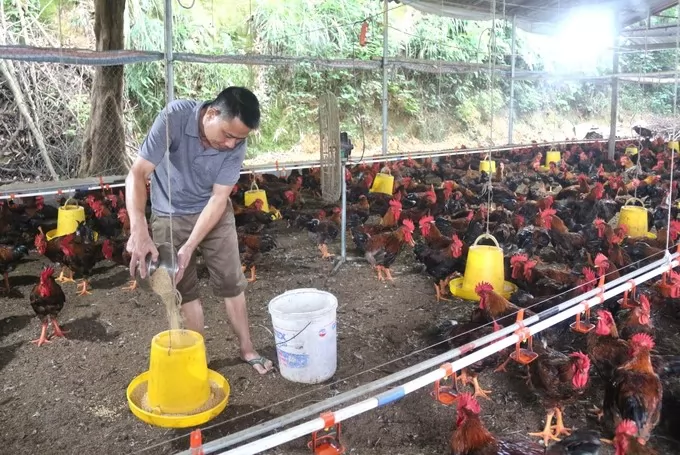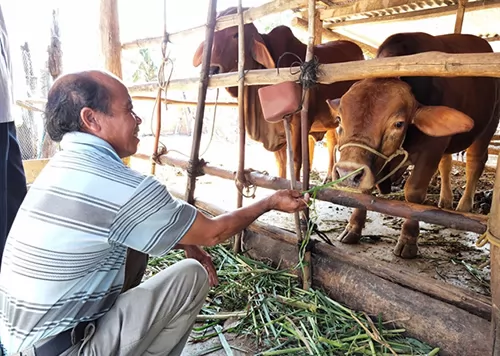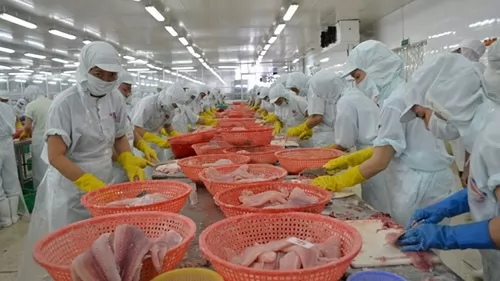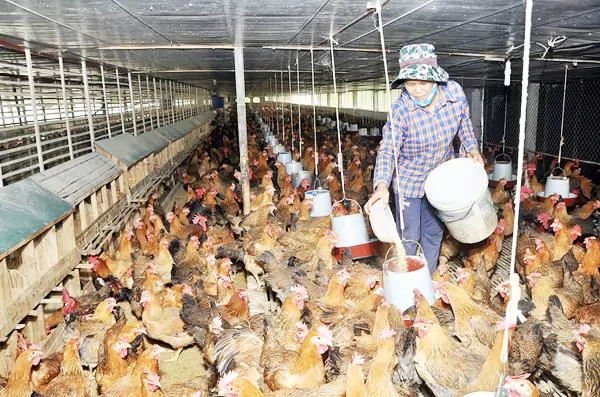Biosafety farming: People are expanded knowledge

The farm raises colored feathered chickens according to VietGAHP standards in Hoa Trung commune, Dong Hy district, Thai Nguyen province. Photo: Pham Hieu.
(VAN) Applying science, technology, and technical advances not only helps breeders improve productivity, quality, and value of products but also expands new knowledge.
Breeders are expanded
Faced with the complicated developments of diseases in livestock herds, implementing models of biosafety farming, VietGAHP farming, organic farming, etc., currently plays an important role in the livestock industry.
In recent times, in Thai Nguyen province, these models have been replicated and brought many benefits, such as ensuring livestock health, saving production costs, protecting the health of breeders as well as consumers, and especially contributing to minimizing environmental pollution.
Typically, seven farming households belonging to the Free-Range Colored Feathered Chicken Farming Cooperative Group in Hoa Trung commune (Dong Hy district) are now raising nearly 10,000 chickens according to VietGAHP standards.
According to Mr. Pham Van Dinh, Head of the Cooperation Group, during the process of implementing VietGAHP livestock farming, people were introduced and guided thoroughly by staff of the Thai Nguyen Provincial Agricultural Extension Center, from building barns and choosing breeds to the processes of care, feeding, hygiene, and disease prevention, especially disease prevention with vaccines.
"According to the staff's instructions, all stages, from the production process, breeds, animal feed, biological bedding, and barn area to farming equipment and tools, are strictly monitored and comply with standards. The mixed bran types used ensure technical specifications, are not moldy, are not out of date, have clear origins, and do not use growth stimulants," said Mr. Pham Van Dinh.

All stages of livestock farming are closely monitored and comply with standards. Photo: Pham Hieu.
Sharing more about the VietGAHP livestock farming process, Mr. Dinh said that in addition to breeds and feed, disease prevention plays a decisive role in livestock farming efficiency. Therefore, he and members of the Cooperative Group have used biological preparations to treat barns and livestock waste to maintain hygiene, prevent diseases, and ensure the health of livestock.
The Cooperative Group's farming households all evaluate that the VietGAHP process has brought good results, with healthy chicken flocks and delicious meat quality. Besides, compared to traditional livestock farming, applying the VietGAHP process has helped keep the farming environment fresh and the barn clean, thereby ensuring the health of breeders.
"In addition to economic efficiency, the biggest benefit of VietGAHP livestock farming is that people gain more useful knowledge in livestock farming, such as choosing quality breeds, well implementing technical measures, using 100% of industrial feed, keeping the barn clean and dry, fully preventing diseases with vaccines for the chicken flock, ensuring biosafety throughout the farming process, etc.," said Mr. Pham Van Dinh.
28 disease-free livestock facilities
Recently, in addition to implementing models of biosafety farming, VietGAHP farming, and organic farming, Thai Nguyen province has promoted the transfer and application of science and technology in livestock development.
According to Mr. Do Dinh Trung, Deputy Director of the Sub-Department of Animal Husbandry, Veterinary, and Fisheries, the locality has promoted the development of both the quantity and scale of farm-scale livestock farming, thereby gradually replacing small, household-scale farming with the application of advanced, synchronized, and productive livestock farming methods.

Thai Nguyen province currently has 57 large-scale livestock farms, nearly 700 medium-sized livestock farms, over 500 small-scale livestock farms, and over 120,000 farmer households. Photo: Pham Hieu.
The province also focuses on managing breed quality and breeding conditions at 75 facilities, thereby improving the quality of cattle and poultry herds. As of now, the proportion of imported pigs and hybrid pigs with high productivity and quality in the province has reached 76% of the total herd; Zebu hybrid cows and high-quality cow breeds reached 68% or more; and quality colored feathered chickens reached 87% of the total flock.
"By applying scientific and technological advances in livestock farming, disease prevention, food safety, and the environment, in recent times, Thai Nguyen province has built disease-free livestock facilities for concentrated livestock facilities. At the same time, deploy disease management and vaccination meeting targets to build disease-free communes and districts," Mr. Do Dinh Trung informed, adding that the whole province currently has 28 livestock facilities with valid disease safety certification and 80 livestock farms with valid VietGAHP certification.
Aiming to develop production chains of pigs and chickens associated with slaughter and product consumption, Thai Nguyen has formed chain production models of farming - slaughter - processing - product consumption. To date, the province has 57 large-scale livestock farms, nearly 700 medium-scale livestock farms, over 500 small-scale livestock farms, and over 120,000 farmer households.
Notes on VietGAHP standards
According to VietGAHP standards, people's farming locations need to be isolated from residential areas, public works, main roads, and sources of pollution. There must be an area for waste treatment; a place to quarantine animals; and an area for cleaning and disinfection of farming tools.
The production and processing area and animal feed warehouse must be separate from places where toxic chemicals are stored and waste treatment areas.

Thai Nguyen currently has 28 livestock facilities with valid disease safety certification and 80 livestock farms with valid VietGAP certification. Photo: Pham Hieu.
Breeders need to take measures to prevent other animals from entering the farming area. The barn is surrounded by a B40 fence.
At the entrance to the farming area, in front of the barn door, a lime pit should be arranged to disinfect people and vehicles passing through.
Tools, equipment, and means of transportation used in livestock farming must be cleaned and disinfected before being brought into the facility and before use.
The animal feed used must have a clear origin and ensure quality for each growth stage of the livestock.
The water used in livestock farming is hygienic, drilled well water. Livestock waste must be collected, recycled into organic fertilizer, and treated according to the provisions of the law on environmental protection and veterinary medicine.
Breeders also need to implement mandatory disease prevention measures for farmed animals according to regulations of the Ministry of Agriculture and Rural Development and disease prevention with vaccines for diseases registered for safety certification and still having protective immunity.
Currently, Thai Nguyen province has 76 livestock farming cooperatives and cooperative groups; 9 businesses producing animal feed; and 30 joint venture enterprises linking in the pork and chicken meat chains. The province is now maintaining operations of over 20 linkage chains of production – slaughter – processing – consumption of livestock products, and linkages with livestock farms in providing breeds, veterinary medicine, animal feed, farming techniques, slaughtering, and product consumption.
Author: Pham Hieu
Translated by Thu Huyen
Maybe you are interested

Gia Lai seeks to improve quality of beef cattle through cross-breeding
GIA LAI — Gia Lai Province, which has the largest beef cattle herd in the Tây Nguyên (Central Highlands) region, has undertaken many programmes to develop the quality of its animals by crossing native cows and hybrid bulls.

Vietnam's seafood exports down 10% due to coronavirus impact
NDO - Vietnam exported US$3.5 billion worth of fishery products in the first half of 2020, down 10% compared to the same period last year as the coronavirus pandemic slashed demand for Vietnamese seafood.

Animal feed prices rise sharply, farmers hit hard
HCM CITY - The price of livestock fodder has risen by 15-30 per cent in the last five months because of higher prices of inputs, and many farmers are facing big losses as a result.





